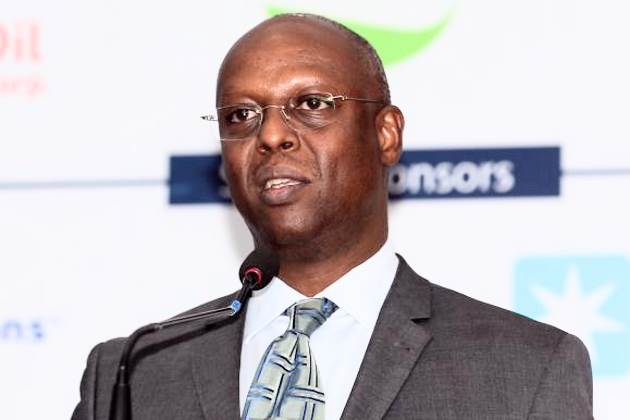Investigations
Gulf Energy Oil Smuggling Scandal, Senior State Officials, Oil Cartels Mentioned

As Kenyans retreated for the Christmas break, some oil industry executives may have taken advantage of the lull and the possibility of relaxed scrutiny to side-step processes used in the importation of petroleum products in the country, according to a section of the industry.
A new twist into the highly guarded smuggling of 30,000 metric tonnes of petroleum into the country by Gulf Energy Limited has emerged potentially incriminating top government officials, senior parastatal officers and oil-tenderpreneurs.
According to insider sources, the officials at the Ministry of Petroleum and Mining are said to have offered a safe veil of shield to invisible but well-connected team code-named “elite group” to facilitate clearance of the consignment at the Port of Mombasa.
Our sources also intimated the timing was also conducive to evade possible detection.
Records show that the vessel, M/T Jag Prerana, was allowed to offload the fuel, worth billions of shillings, by officials from the Ministry of Petroleum following a request from oil marketer Gulf Energy despite the fact that it was not among the firms prequalified to bring in the commodity.
Joseph Wafula, Chief Economist at the Ministry of Petroleum directed clearance of the consignment upon payment of the requisite levies and taxes on December 30, 2021.
Charles Nyakundi, Supply and Trading Manager at Gulf Energy had written to the ministry and the Kenya Pipeline Company (KPC) seeking clearance for the cargo to be offloaded.
Through a protest letter to Petroleum and Mining Principal Secretary (PS) Andrew Kamau, Oil Marketers Association of Kenya (OMAK) questioned how Gulf Energy Limited imported 30,000MT of gasoline for an “elite” group of oil marketers without knowledge of the all-other oil marketing companies (OMCs).
OMAK says the timing for both arrival and discharge of the cargo by Gulf Energy was meant never to be discovered due to the festivities and now wants the ministry to investigate the matter.
“You are aware that the Petroleum Act of 2019 outlaws all private imports for refined petroleum products into the country. As the custodian of the OTS document, we believe that the ministry should continue protecting the authority of the document. Allowing such imports undermines the document and can easily lead to acrimony in the Oil industry,” read part of the letter.
The Petroleum Act that came into place in 2009 outlaws private imports for refined petroleum products into the country.
The Act requires the Ministry of Energy and the Energy Regulatory Authority (Epra) to oversee the importation of petroleum products through the Open Tender System.
The system allows the lowest bidder on any given product to import on behalf of all the other oil marketing companies.
The association wants the ministry to investigate when the cargo was tendered for and if so through which medium was it tendered that all their members did not get to know about it neither got an opportunity to participate in the sharing of the cargo.
They also want to know how one OMC, Gulf Energy Limited, considered to deliver the cargo without going through the normal tender process.
Further, the association also wants to know who the beneficiaries of the cargo are.
“The vessel that should be discharging currently is the MT Sloane Square delivering Gasoil, and is now sitting outside while demurrage is accumulating, who will pay for this demurrage?” posed the association.
“With this recklessness we are left with no choice other than to institute a legal suit to all the concerned parties,” OMAK added.
Appearing to be defending the cartels, Petroleum Principal Secretary Andrew Kamau said the petroleum products had been imported within the provisions of OTS. He added that the issues that could have arisen may be due to misunderstanding of how the OTS works among some players or even differences among themselves.
He explained that the cargo in dispute was part of a tender that Gulf Energy had won earlier. The firm had requested the industry to allow it import in different batches.
The 30,000 metric tonnes of super petrol was the second cargo.
“Once they have been awarded the OTS tender, the modalities of delivering the products is up to the marketer. It might be through one ship or multiple ships as long as the other oil markers are in agreement. A request to deliver in more than one batches is made during the vessel scheduling meeting (VSM), which in this case was done and approval given. The quantity and price however do not change,” he said, adding that the oil marketers – including members of Omak – had representation at the VSM meeting that gave the vessel Jag Prerana the go-ahead to discharge ahead of the others.
“I fail to understand the issues they are raising in the letter. Is it that they wanted to buy the fuel but denied the opportunity or that they did not want Gulf Energy to import?”
He said at the OTS, the government acts as the referee in overseeing the tendering process, adding that everything else is in the hands of the oil marketers.
Omak also noted that the vessel that brought the fuel displaced other ships that should be discharging petroleum products at the Kipevu Oil Terminal. This could result in supply hiccups over the coming weeks. Already there are reports of fuel shortage in the country.
At the government-run oil facility, only one tanker can discharge at a time, and whenever vessels are waiting to discharge products, they penalise Kenyans by charging demurrage fees.
The Kenya Ports Authority is in the final stages of building a Sh40 billion floating terminal that will allow four vessels to discharge at a go, cutting demurrage charges. “The vessel that should be discharging currently is the MT Sloane Square delivering gasoil and is now sitting outside while demurrage is accumulating, who will pay for this demurrage?” poses the association in the letter to PS Petroleum.
It added that “Epra should not allow demurrage related to the next four vessels that have already arrived at the port of Mombasa be passed to the Kenyan consumers”.
Sloane Square, which has been waiting to discharge since December 13, is bringing in 86,000 metric tonnes of diesel. Other vessels that are queuing to offload are MT Front Future that has 85,000 metric tonnes of super petrol, MT Alpine Confidence (78,000 metric tonnes of jet fuel) and MT Apostolos II (86,000 metric tonnes of diesel).
Who are/were the owners of Gulf Energy and their Connection Political affiliation.
In the takeover of Gulf Energy Holding Ltd. At least five Kenyans earned over one billion shillings in the total takeover of the Gulf Energy Holding company by the French multinational Rubis Energie .
Rubis disclosed in its 2019 annual financial results that it spent Sh9.72 billion in acquiring Gulf Energy Holdings Limited Kenya a subsidiary of Gulf Energy.
Mombasa Gubernatorial aspirant Suleiman Shabal was the CEO of Gulf Energy and the Founder Chairman of the Gulf African Bank earned an estimated Sh2.4 billion from the deal. Shahbal had a 25% stake in the Gulf Energy through his company, Monte Carlo Investments Limited, records from the Registrar of Companies shows.
Francis Koome Njogu, was the Managing Director of Gulf Energy is estimated to have earned Sh1.9 billion from his 20% stake in the company. Njogu is a businessman and owner of Alba Hotel, in Meru town.
Duncan King’ori Mukira who earned Sh1.2 billion from his 12.5% stake and Paul Kiprotich Limoh, a similar amount from a similar shareholding. The rest of the 25% stake in Gulf Energy Holdings which also earned an estimated Sh2.4 billion was owned through a company called Nama Kenya Limited, a U.K registered company that is a minority (20%) owned by a Kenyan named Ahmed Said Bajaber, who is a director at the Gulf African Bank.
Gulf Energy is a diversified energy company in East Africa. On its website, it notes the following.
“We source, charter, export, retail and store quality petroleum products from all over the world to various destinations in East Africa. The deal was first announced in November 2019 but was given final approval on February 25th by the Competition Authority of Kenya.
There could a possibility that Gulf-energy being the victim of the expose was a shell of Rubis in this case. Gulf energy might have been an escape goat plan should the heist go sour as it has.
Rubis is an International brand and cant afford to be mud-slang in any way hence getting vulnarable to their enemies like Total Energy and Vivo Energy in Kenya and the international market at large.
Kenya Insights allows guest blogging, if you want to be published on Kenya’s most authoritative and accurate blog, have an expose, news TIPS, story angles, human interest stories, drop us an email on [email protected] or via Telegram
-

 Grapevine1 week ago
Grapevine1 week agoAlleged Male Lover Claims His Life Is in Danger, Leaks Screenshots and Private Videos Linking SportPesa CEO Ronald Karauri
-

 Lifestyle2 weeks ago
Lifestyle2 weeks agoThe General’s Fall: From Barracks To Bankruptcy As Illness Ravages Karangi’s Memory And Empire
-

 Grapevine4 days ago
Grapevine4 days agoRussian Man’s Secret Sex Recordings Ignite Fury as Questions Mount Over Consent and Easy Pick-Ups in Nairobi
-

 Investigations2 weeks ago
Investigations2 weeks agoEpstein Files: Sultan bin Sulayem Bragged on His Closeness to President Uhuru Then His Firm DP World Controversially Won Port Construction in Kenya, Tanzania
-

 Business2 weeks ago
Business2 weeks agoKRA Can Now Tax Unexplained Bank Deposits
-

 Investigations1 week ago
Investigations1 week agoEpstein’s Girlfriend Ghislaine Maxwell Frequently Visited Kenya As Files Reveal Local Secret Links With The Underage Sex Trafficking Ring
-

 News1 week ago
News1 week agoState Agency Exposes Five Top Names Linked To Poor Building Approvals In Nairobi, Recommends Dismissal After City Hall Probe
-

 Investigations1 day ago
Investigations1 day agoMulti-Million Dollar Fraud: Three Kenyans Face US Extradition in Massive Cybercrime Conspiracy


















